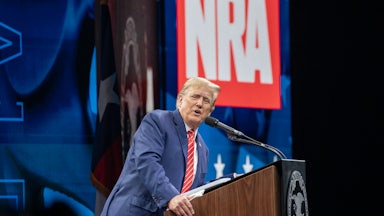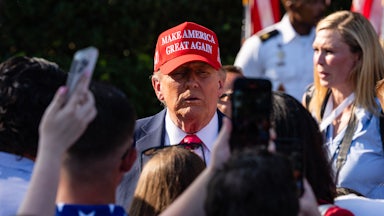The most obvious aspect of President Donald Trump’s big tax cut and spending package is that it engineers a massive transfer of wealth and resources from the working class to the wealthy, along the way guaranteeing that the country will become both a less safe and less economically secure place to live. Among the underdiscussed components of the recently enacted bill, however, is what it means for women—particularly women with young kids. For women at a vulnerable time in their careers, Trumpism offers new pressures and problems, as conservatives push a radical and retrograde notion of family life onto them, all while removing the resources those families depend on to stay afloat in an increasingly unequal economy.
Trump’s megabill hits women at a time when culture-warring conservatives are more openly pushing to force more women to stay at home with their kids—and arguing that if they’re going to go to school at all, they should do it for their MRS degree. The bill is the latest win for Republicans who are trying to peel away women’s agency at every level by making it harder for women to have economic stability and reproductive freedom. It contains hits to reproductive care funding (though a judge has temporarily blocked this part of the law from going into effect), deep cuts to SNAP benefits and Medicaid that will affect caretakers of all ages, and measures that make it harder for kids to get free school meals.
On top of that, the immigration crackdown funded by the bill is damaging for many immigrant women and their kids. It also poses long-term economic risks to the financial security of women in general. The removal of immigrants will hurt the job market and make the economy worse, economic experts say. If the Trump administration were to actually meet its goal of deporting 4 million immigrants over four years, it would eliminate half a million childcare jobs.
Joyce Jacobsen, professor of economics at Hobart and William Smith Colleges, said she thinks immigration policy will have an adverse effect on the labor market.
“Given that we know that they have a large presence in the caretaker labor market, both formal and informal, there could be a direct effect through the formal numbers dropping, but also an indirect effect through the displacement as immigrant caretakers leave and family members (as in women) then reduce their work hours to take care of dependents (both children and elderly),” she told The New Republic.
Although the majority of women with kids work—and 40.5 percent of women with kids under 18—are the sole, equal or primary breadwinners in their family, the Trump administration’s megabill, combined with other Republican policies, make it both harder to be a working mom and more difficult for unemployed moms to get back to work, advocates for women’s economic progress say. The Trump administration will force many women into socially and economically precarious situations that make it harder for them to have financial agency. In addition to everything that the megabill achieves to push more women into the narrow gender roles conservatives seek to enforce, the Trump administration is blocking nearly $7 billion in funding for grant programs that support after-school programs and summer learning, which many parents depend on for childcare as they work.
A slowing economy could place women with young kids, who are already subject to the motherhood penalty, in a difficult position as well. Different models provide varying probabilities for a recession but although they have fallen from previous months, they are still far higher than the long-term average probability of 15 percent. Although the economy added more jobs than expected in June and the unemployment rate fell to 4.1 percent, job market data shows slower than expected wage growth—and the average duration of unemployment has increased.
Sarah Jane Glynn, a fellow of macroeconomic analysis at the Roosevelt Institute, said research shows wage growth is often a factor in the choices mothers make—particularly partnered women—around paying for expensive childcare versus leaving the workforce or reducing hours. But she said it’s too early to know whether wage growth will be low enough to make it undesirable for many parents, and mothers in particular, to stay in the workforce.
The unemployment rate for Black people in June rose to its highest rate since January 2022, with an unemployment rate for Black women of 5.8 percent. Black Americans are often the first to experience changes in the economy because of racial discrimination and systemic racial inequality, economists have frequently pointed out.
Clara E. Mattei, professor of economics and director of the Center for Heterodox Economics at the University of Tulsa is the author of The Capital Order: How Economists Invented Austerity and Paved the Way to Fascism. Her work focuses on how the state protects capitalism, and the way austerity policies and economics work together to achieve these goals.
“Trump’s version of austerity really reveals the essence of what austerity is all about. Of course it has nothing to do with fiscal responsibility but all to do with actually shifting resources away from the working people to increase their market dependence, so the fact that in order to survive there’s no alternative but to go work for a wage and a very low one.”
The administration’s drive to discipline workers is a response to workers having more power in the labor market, which they were able to exercise thanks to increased government subsidies during the Covid-19 pandemic, Mattei said. As a result of the megabill, DOGE, and other Republican policies, women will be among the groups who face the most economic adversity and will have to adapt more quickly to accept greater exploitation.
“I suspect that what we will see is ultimately more women having to accept very precarious conditions in order to survive,” she said.
Women are also more likely to face a range of complications that only add to the economic adversity. They are at greater risk of intimate partner violence when their economic agency is low, advocates to end violence against women and children say. Poverty and economic hardship increase someone’s risk of intimate partner violence and men’s control of income and low socioeconomic status are “strong predictors of abuse,” 2024 research shows.
Many of the Trump administration’s policies, along with the megabill, will set women and their families up for greater vulnerability to abuse in all of its forms, including financial control, at a time when conservatives are selling a “trad wife” lifestyle to young women on social media and fighting to get rid of no-fault divorce. The administration is also creating uncertainty for groups that run domestic violence programs. Earlier this year, the Trump administration froze federal funding for domestic violence programs and removed notices of funding opportunities from the Department of Justice’s Office on Violence Against Women website.
Kiersten Stewart, vice president of public policy and advocacy for FUTURES WITHOUT VIOLENCE, an advocacy group that focuses on ending violence against women and children, said that there are several ways the megabill harms intimate partner violence survivors, many of whom are women. She said that when abusers actively sabotage their partner’s ability to get a job, even the small percentage of people on Medicaid who don’t work, and are often caregivers, will certainly be impacted.
“The single biggest reason that most people report for not being able to leave an abusive relationship is economics, right? This bill makes it so much harder on victims of domestic violence who are low income,” she said. “You have to be able to prove that you’re working and a lot of time for survivors, it’s really hard to have the paperwork if you’re fleeing an abusive situation or living in a shelter or living in temporary housing.”
Stewart said flexible cash assistance is one of her organization’s key policy recommendations to ensure women have access to the resources they need to maintain financial agency.
Jocelyn Frye, president of the National Partnership for Women & Families, said that there needs to be more support for women at all stages of caregiving and all kinds of work statuses to make sure women are economically and socially secure. Childcare, eldercare, and other family support policies that only focus on people in traditional employment, and require immediate attachment to work, leave behind people who are self-employed, seasonally employed, and have nontraditional employment statuses—many of whom are women, she said. There are better alternatives; policies that include women who face intimate partner violence issues. A federal bill, for example, would ensure that people can take paid sick time as a result of intimate partner violence.
Advocates agree that one of the main challenges will be for states to support women at a time when they are losing so much federal funding. “We’re going to need a lot of innovation, including programs that are going to have to be funded out of states’ pockets completely to try to cover the loss of federal funding around healthcare and from a women’s perspective, making sure folks have access to the whole range of care they may need throughout the course of their lives,” Frye said. “Are there things states can do? Sure. I think it is not possible for states to offset the incredible set of resources that this bill demands and they know that.”
Mattei said that even policies like living subsidies for mothers are too radical for many policymakers in power to accept now.
“Even in this very kind of fascistic mentality that you just want your population to grow is in a way is conflictual with the logic of our economy that requires market dependence to be enforced,” she said. “I don’t think that’s actually going to be a possible route because it is too dangerous for the system. You see the system cannibalizing itself because ultimately you are slowly getting rid of the source of value, which is the workers who work more than what they get in their paycheck.”










